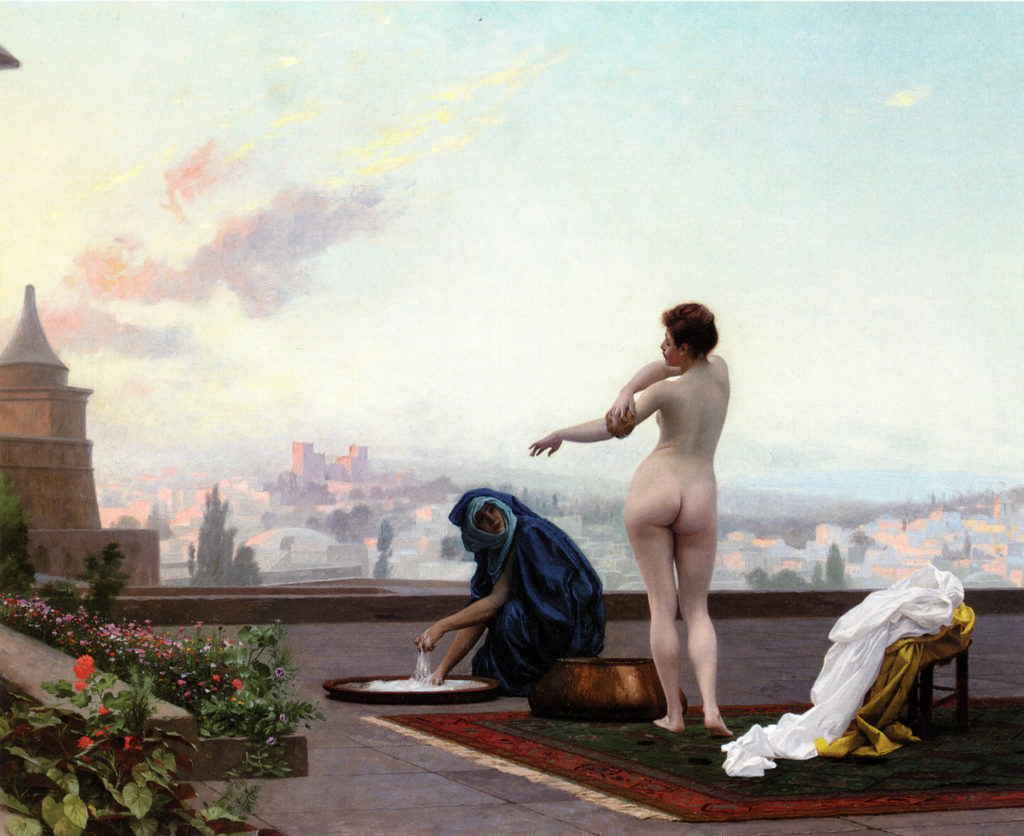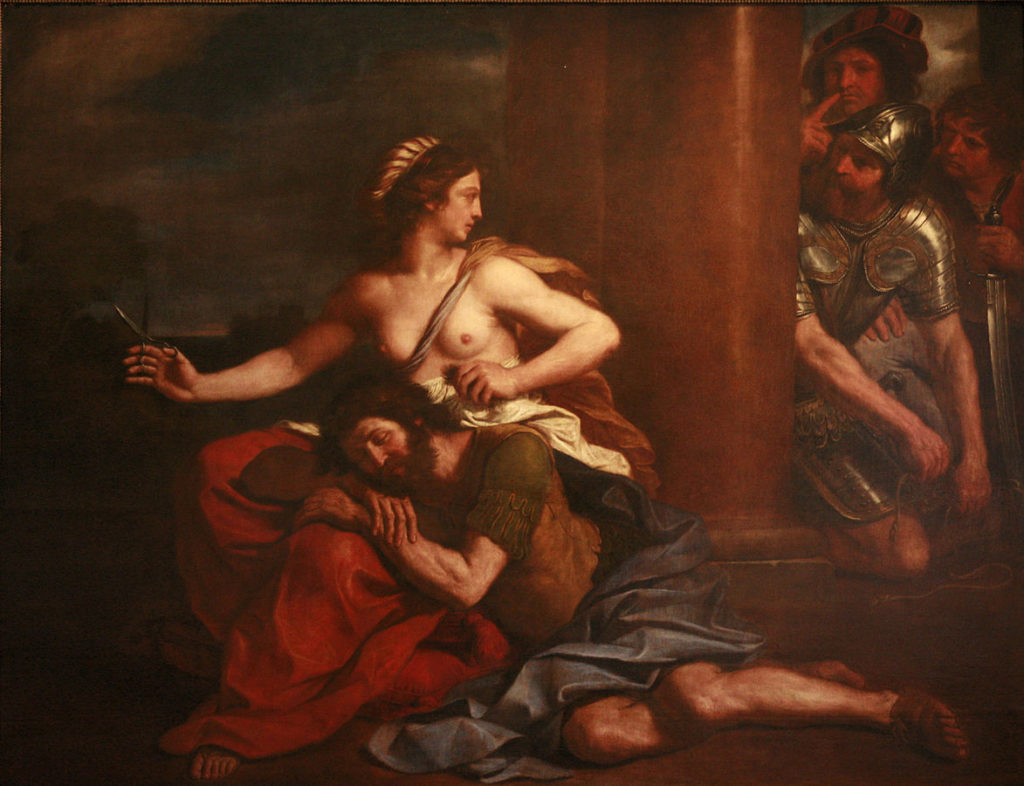
Bethsabee (Bathsheba), painting by Jean Leon-Gerome, c. 1889
In my early and mid-twenties, I wrote several drafts of a screenplay in which a modern-day Virgin Mary who received word the second coming of Christ would happen through an immaculate conception in her womb essentially says, “No thanks. Find someone else.”
I wrote the scripts during a period of sexual awakening, one that was delayed by most standards. I had never had sex, but I wanted to, and at age about 24 I became receptive to the idea that maybe certain death wouldn’t immediately follow me if I, an unmarried woman, had sex. I didn’t analyze the motivation behind my scripts when I wrote them, but I’m certain now My Mary was my way of safely entertaining what might happen if I stepped outside the bounds of religious fundamentalism, biblically and in my life.
I thought about the Mary I had reinvented the last week of July, when Operation Save America, a group that, according to its website, “takes up the cause of preborn children in the name of Jesus Christ,” and “employ[s] only biblical principles,” held a gathering in my home town, Louisville, Ky. Joined by Created Equal, a religious group that also aims to “save babies from abortion,” and supporters from across the nation, OSA members demonstrated daily in front of the EMW Women’s Clinic, the last clinic in Kentucky that provides abortions. They sang and prayed. They screamed various words of condemnation at women and men entering the clinic. They showed video of an abortion on a Jumbotron outside Louisville Metro Government’s City Hall. Reports on social media allege they also sent mailers with the names and addresses of doctors who work at the clinic and of women who had received their services.
I have little faith OSA and similar groups will ever change their minds about the morality of abortion and their duty to stop it, so on social media, I lamented their tactics. A friend responded with an alluring suggestion. What if these protestors “dare[d] to conceive of respecting women’s agency as a practice completely in line with Christian doctrine?”
I began to think about what messages I had received at church about women’s agency and what it might take to fulfill my friend’s vision. When I was in college, I heard a female preacher leading a Bible study from 2 Samuel relay the first sexual encounter between Bathsheba and David this way: Bathsheba was on her roof, naked. David saw her from his palace, liked what he saw, and summoned her. She came over. They had sex. She went home.
“Come on church, you know that was a booty call,” the preacher said. In other contexts where I had seen or heard “booty call” used and in the preacher’s interpretation of 2 Samuel, the woman summoned a man’s contact through her clothing, lack thereof, or demeanor. Through her immodesty, she controlled the situation.

Samson and Delila, painting by Guercino, ca. 1653
That Bible study reminded me of something I learned in other ways before: seduction or temptation of men was one of the ways women had agency. In various other Christian contexts, I had also learned Delilah sweet-talked Samson into relinquishing the secret to his superhuman strength, and Queen Esther used her beauty and position to save her people from genocide.
In the Bible—and because I was taught the Bible applies to modern-day culture, also in life—women also exerted power over others and influenced outcomes through arrogance and disobedience, like Eve, the second human ever to exist but the first to sin. She led her husband in the destruction of all of mankind. Mary, the mother of Jesus, was always the good virgin who preserved her body, said yes to God when given the opportunity, and, in true counter-narrative to Eve, had a starring role in the salvation of all mankind.
I had learned sexuality and purity are the predominant means through which women control their lives, and sexual power often results in destruction. I imagine, then, for a group like OSA, respecting women’s agency, especially to make decisions related to sex, is impossible. Yet, taking cues from Jesus, my friend’s suggestion isn’t farfetched. Jesus applauded women who boldly demonstrated faith, like the woman who had hemorrhaged for twelve years and violated social taboos by pushing through a crowd and touching him. He also praised women like Mary, the sister of Lazarus, who wanted to study under a rabbi rather than do housework. The first people to share the good news that Jesus had risen from the dead (in other words, the first to preach the gospel) were women. Even the apostle Paul, who might be known more than anything else for demanding women keep silent in church and submit to their husbands at home, wrote, “There is neither Jew nor Gentile, neither slave nor free, nor is there male and female, for you are all one in Christ Jesus.” In a society in which women were chattel, Paul championed racial, social, and gender equality as a result of baptism. An equitable society could be formed once people knew Christ.
In an equitable society, women aren’t property of their fathers until they become property of their husbands. They have their own lives. They make decisions for themselves. Sometimes, they decide to have abortions.
Pastors at churches I attended didn’t talk much about abortion. Nevertheless, there was messaging about women’s agency, and I accepted it without thinking much about it. Graduate study, womanist theology, and friends who discarded fundamentalism from their Christian practice helped me to see something different in the scriptures and their interpretation.
In the story of Bathsheba, I now see a woman who was raped by a king still considered “a man after God’s own heart.” Delilah took her orders from Philistine rulers; what consequences might she have suffered for not doing what they wanted? Though it’s still a terrible message to send to women and girls, I see Eve as punished for her curiosity rather than for arrogance. Esther succeeded with beauty, prayer, and fasting, and just as important, she wouldn’t have been in her position as a concubine at all had her predecessor, Queen Vashti, not been put out of the palace for standing up for herself.
I see Mary, an impoverished teenager accustomed to being in a social position lacking any privilege or authority and possibly with knowledge of scripture she had only heard, not been taught to read and study for herself, as highly unlikely to have said, “No,” to God. The Amplified Bible translates her response, “let it be done to me according to what you have said.” Whether “let” is permission, or it’s, “I accept,” her position is passive; something she neither asked for nor planned is going to be done to her. If she wants to stop it from happening, she doesn’t. She is the woman whose agency always has been spun for me in the most positive ways—despite how little her life parallels that of women in the 21st century.
In contrast to the biblical Mary, My Mary was in her twenties, well-educated, and middle-class enough to live simply but comfortably as long as she had a roommate. In my version of the story, Mary asks Gabriel to clarify if a holy pregnancy will happen because God said it would or if it could happen only if she consented to it. My Mary has the benefits of age, education, money, culture, and a more equitable society. She has the audacity to demand a say in what she did with her body, how she expressed her sexuality, when she started a family, and how she, an unmarried woman and artist who wanted to be everyone’s favorite aunt but never a mother, spent her life.
I know now when I wrote those scripts, I was seeking something I wasn’t getting in church but needed to guide me as a grown woman in the twenty-first century. A message that didn’t frame my life’s purpose so strongly within marriage and motherhood would’ve helped me identify bad relationships faster and leave them sooner. Agency that didn’t shame sexuality would have made me more comfortable in my own skin and more trusting of my ability to make major life decisions.
I wrote fiction to create a safe place for me to explore my questions, desires, and agency. I can now dare to conceive of a church being that place, and of women in and out of its pews being better off for it.

Recent Comments